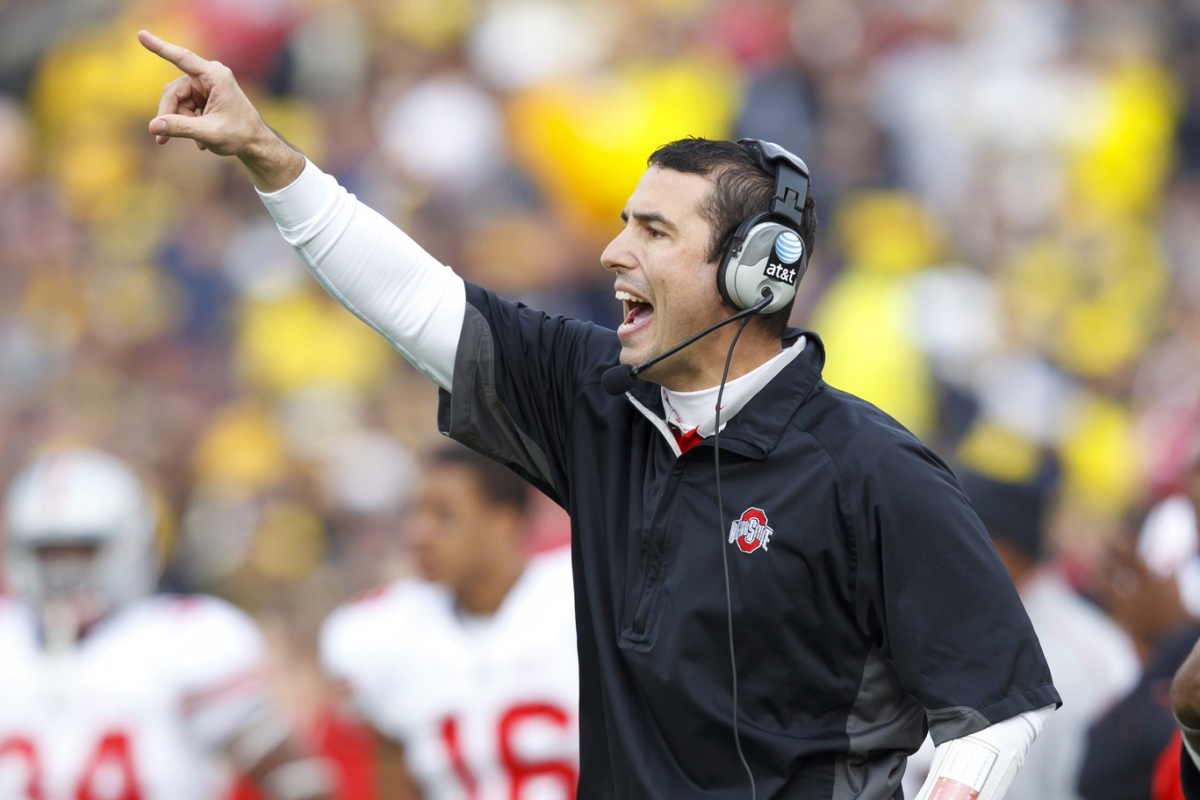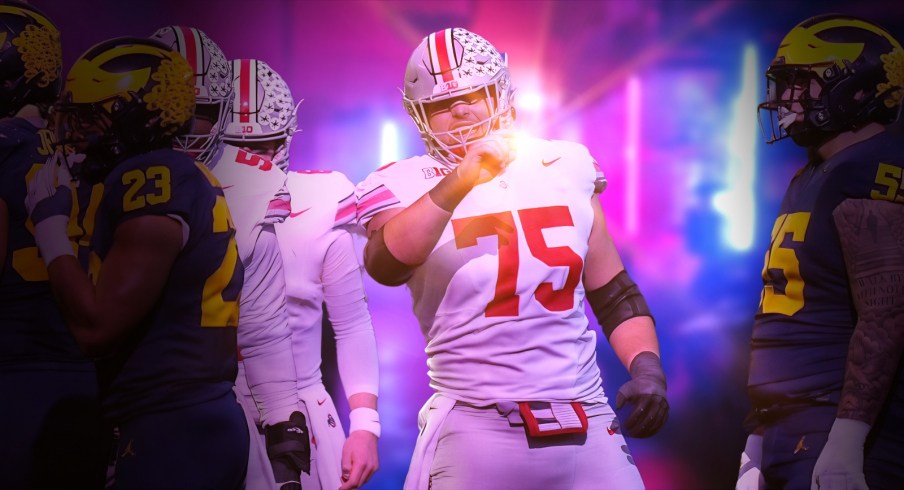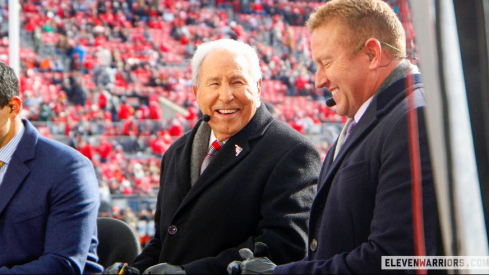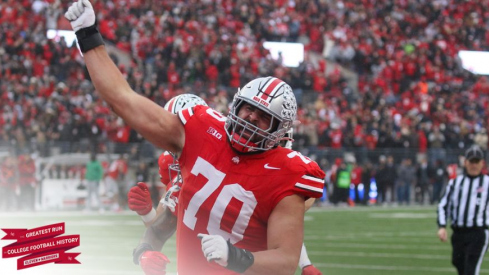Luke Fickell had inherited an unenviable mess.
This isn't Paul Chryst slander and you're not reading a Wisconsin season preview - we're talking about took place 13 offseasons ago in Columbus over this past weekend when Jim Tressel was abruptly separated from the first B1G dynasty of the millennium.
Fickell was handed the reins of his alma mater at the onset of summer with a coaching staff meticulously designed to support the Tresselball Industrial Complex, which meant he did not inherit a dedicated play caller or a quarterbacks instructor. A Linebackers coach would be casting the deciding vote in a play calling conflict.
He didn't just lack a QB coach - he didn't have a quarterback either, as Rose Bowl and Sugar Bowl MVP Terrelle Pryor understood the mess Fickell had inherited and quickly declared for the NFL Supplemental Draft. This machine couldn't operate efficiently without Tressel in the cockpit. It only worked because he was so involved in the navigation.
Fickell's college roommate had just retired from the NFL after a 14-year career and had nothing but time on his hands. No experience whatsoever, no problem - Mike Vrabel immediately took the role Fickell had vacated.
In hindsight, Vrabel was an incredibly shrewd hire even if you ignore the fact he was running an NFL franchise eight years later. There was no way Fickell would be able to abruptly secure the coaching acumen Ohio State was missing in June to maintain a Tressel standard for a 2011 season that would be played entirely beneath an inescapable black cloud. All the hindsight in the world wouldn't have produced a better hire.
Onboarding a system guru capable of running a Diet Coke version of Tresselball would have been futile and besides, Jim Bollman was still around to do that. Bringing in a Chip Kelly-type on no notice would have required an impossible level of integration headaches and would have backfired spectacularly.
The program was radioactive beyond the walls of the practice facility. No one was signing up to work for a program willing to forfeit non-conference games to avoid a television ban (that was never true but sometimes it's hard to remember how batshit the summer of 2011 was).
So Fickell brought in a guy he trusted implicitly who got it, and it wasn't coaching football. When he and Vrabel were atop the program as players during the mid-1990s it was understood that if you were slacking, falling behind or failing to uphold the standard it was much better for you to be caught by the staff than by Fickell or Vrabel. You'd rather piss off John Cooper himself than those two.
"Toughness" shows up on plays where informed crowds like the ones in Columbus or Ann Arbor adjust their volumes accordingly.
This is what Fickell understood better than anyone else. He couldn't replace the irreplaceable; those gaps were doomed to stay unfilled in 2011. So he chose to accentuate the favorability of what he had inherited. Culture. Team orientation. The understanding that the lyrics to Across the Field contain enough strategy to win games the way Tressel had been winning them.
He would keep the team together through brotherhood, shared purpose and a stubborn belief that no matter what happened to the program, they would still define it. They were the deciders. Nothing outside of their locker room mattered or merited their attention.
And so in fall that unenviable mess trotted out what would become the FBS's 107th-most prolific offense, led by a Marlboro-smoking 26-year old platooning with an 18-year old true freshman. The six Tatgate guys were either gone or held out nearly half of the season. DeVier Posey, easily the top returning receiver, was held out 10 games - so those two green quarterbacks wouldn't be getting a bailout.
The season was cooked before kickoff. And yet, that doomed edition of the Ohio State Buckeyes was the toughest one of the past 20 seasons, with a nod to the adversity-riddled 2014 national champions.
What Fickell got out of a fractured roster and a refugee coaching staff was a mediocre football team that pushed every single opponent to the brink before prevailing or falling short. Superlatives are inescapable and Disney movies are full of shit. Having dudes matters. The 2011 team didn't have the dudes.
It failed to eclipse 17 points five times and dropped five conference games by 25 total points. A typical middling Tresselian offense ranked 57th nationally operated by its engineer ends up in Pasadena facing Kelly's Oregon Ducks again. Instead, what Fickell kept together went 6-7 and was a chronic pain in the ass despite being destined for a dust bin.
Toughness can be mistaken as a syrupy, unquantifiable football term often misplaced in what's become the analytics era. It's something Charlie Weis wouldn't even pay lip service to while nursing on the comforting arrogance of his NFL-honed schematic chops back when Notre Dame was losing games for every possible and hilarious reason.

It's also something current-era Ohio State has made into a bit of a battle cry, unfortunately. That's well-intentioned but it's about as efficacious as scribbling lose weight you fat ass notes to yourself.
Toughness shows up on plays where informed crowds like the ones in Columbus or Ann Arbor adjust their volumes accordingly. In 2011 the Buckeyes and Wolverines threw haymakers at each other for 60 minutes before the home team pulled it off in the final minutes. The 2023 version of that meeting followed the same plot, all the way down to the six-point deficit and the errant through.
But those two afternoons looked nothing alike up close. Coaching scared isn't toughness.
Outside of one 2nd half drive, Ohio State never exerted its will or bullied Michigan. Every other 2nd half possession in each of the past three meetings has produced a clear-cut winner. If this was a heavyweight fight with score cards instead of a scoreboard they all would have been unanimous, uncontroversial decisions.
The recent Buckeyes have been trying to reclaim what was theirs prior to the pandemic and for the current Ohio kids - rediscovering the only childhood memories they ever knew. The program has oscillated between cuteness, brilliance and panic en route to where it finished last season.
Which is to say Toughness hasn't been the primary source of their psychic energy for a long time.
That's because it needs to emanate from somewhere inside the program. A decade ago while preparing for what would become a national championship season Urban Meyer declared the offensive line the heart and soul of the football program. That unit had just lost Jack Mewhort, Corey Linsley, Andrew Norwell and Marcus Hall, nearly 80% of its production, and was still considered its power source.
This is unit culture, from which the program in-sourced the toughness required to bully 14 opponents that season. The 2024 offensive line probably isn't up to the task as it continues to course-correct from sequence of errors and shattered confidence, but it would be naive to think that's the only place the Buckeyes can for what's been lacking.
Seniors isn't a bad place to harvest, though from a sustainability standpoint a unit, any damn unit, needs to show the rest of the program how to exert physical, technical and psychological dominance on Saturdays - and especially over the program it kept in hell for two decades and four coaches.
This program in the not-so-distant past featured smaller quarterbacks running over guys. Recently, we've seen larger guys either reluctant to make themselves targets or getting hurt while sliding. Late-stage Meyer used to over-rely on toughness at the expense of scheme. That's been replaced with an over-reliance on scheme while shouting about toughness.
Day has been spent more time with Tressel since last season ended than he had in all of the previous years of his life combined, which might be more important than any retained senior or transfer portal coup. Fickell inherited an unenviable mess on account of scandal; what Tressel left behind that the NCAA couldn't touch was an energy source capable of taking the primitive, plodding art of Tresselball to the heights it achieved and never relinquished.
And by the looks of the moves Day has made since December, he's putting himself squarely in charge of a top-down directive he may have been too conflicted to properly manage in his previous role as position coach, play caller, coordinator and lead recruiter. Now he can dedicate himself to making a team that's smart, schematic, talented and a huge pain in the ass in matchup games.
He had been choosing to accentuate the favorability of what he had inherited. Talent. Testimony. The understanding that winning on Signing Day contains enough strategy to win games the way Meyer had been winning them. When he took over in 2019, our optimism lens suggested the first-time head coach would be a combination of Ohio State's past two leaders.
Now that Day's able to dedicate himself to empowering what's been lacking, that's what he'll be.



